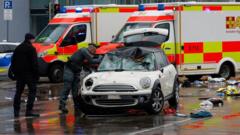In a distressing incident in Munich, at least 30 individuals were injured after a car was driven into a crowd during a transport workers' union rally, just a week ahead of Germany's federal elections. The driver, identified as 24-year-old Afghan asylum-seeker Farhad N., was promptly detained by police, who indicated the possibility of an extremist background.
Germany's Chancellor, Olaf Scholz, emphasized the necessity for punitive action and deportation for the driver, amidst a worrying trend of violent attacks in the country. The ramming occurred near the main train station around 10:30 AM local time, with police reportedly shooting at the vehicle before the driver was apprehended. Eyewitnesses described scenes of panic as attendees sought shelter.
The attack comes shortly before the Munich Security Conference and echoes previous assaults linked to immigration issues, raising alarms just days before the elections set for February 23. The suspect, who had been in Germany since 2016, had previously had his asylum request denied and was expected to be deported in 2020, although he remained in the country due to security concerns in Afghanistan.
Bavaria’s Premier Markus Söder termed the event a "suspected attack" and called for urgent reforms in Germany's immigration policies. He compared the distressing echoes of this incident to a similar one in Magdeburg that resulted in multiple fatalities. Bavaria, already on edge from a stabbing incident weeks prior involving an Afghan national, is facing increasing scrutiny over its immigration and security policies.
As the political landscape heats up, calls for "remigration," or mass deportations of immigrants, have gained traction, notably from the far-right AfD party, which currently garners significant polling support. Meanwhile, significant deportations to Afghanistan have resumed, as the government aims to address public safety concerns amidst fears of further violence linked to immigration.

















